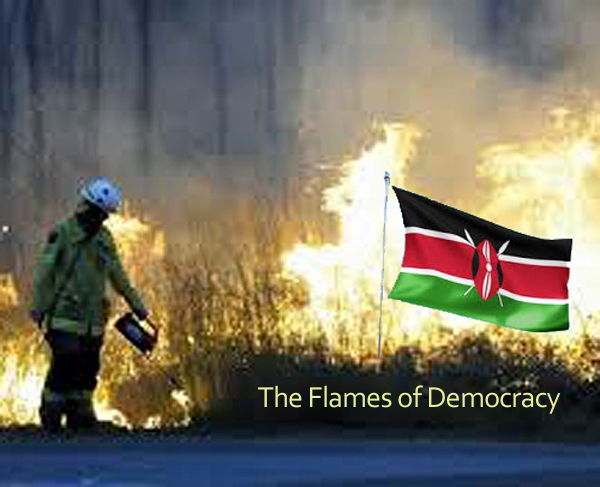 Kenya’s August 8 national election will test democracy as never before, anywhere in the world. Kenya’s incredible tribalism and its new found intellectualism are being force-blended into a modern world that just so happens at this very moment in human history to be questioning the very worth of democracy.
Kenya’s August 8 national election will test democracy as never before, anywhere in the world. Kenya’s incredible tribalism and its new found intellectualism are being force-blended into a modern world that just so happens at this very moment in human history to be questioning the very worth of democracy.
I think it will make it. Others aren’t so sure.
I’m in Nairobi. The mood is apprehensive. With 11 days to go national attention has moved away from the candidates to the enigmatic IEBC, the unique Kenyan government institution charged with certifying the election results.
This beleagured body has seen multiple chairpersons and board members come and go with the whims of politicians and the breaking news of member scandals. Months ago so much national distrust of the body broke into the open that the rival political parties announced they would create their own counting bodies.
There are so many court challenges against the IEBC pending and recent critical decisions against its policies that the body is near collapse or at least catatonic suspension. An outsider like myself can’t but conclude that the body politic simply doesn’t want to certify a winner, perhaps for fear of igniting violence.
This notion was strengthened when late in the game parliament voted to allow independent contestants for the presidency while still requiring that the winner gain more than 50% of the vote. There’s a growing possibility this won’t happen, and that a run-off election will be necessary.
Talk about kicking the can down the road…
More than a dozen countries have issued recent travel warnings referencing the upcoming election. (Not the U.S., by the way, which historically has led this pack. Note there has been very little of anything to come out of the U.S State Department recently regarding any country.)
Canada, Spain, Britain, France, Sweden, Australia and Russia have all urged their citizens in Kenya to avoid demonstrations and to keep abreast of current news. None have suggested to avoid traveling here much less to return home.
A number of Kenyans I’ve spoken to – using an interesting vernacular – are “sorting themselves out.” They plan to hunker down in their tribal area over the election period. Many are referring to the “election vacation”: going back to where if they weren’t born, their grandparents or great-grandparents were.
The last election turned out OK, but it teetered on the fence of catastrophe until the Supreme Court determined a victor following a month of legal wrangling over extremely close results. The one before that in 2007, the first truly free and fair contest since independence, was horribly violent and destructive.
Violence erupted after the results were so close both sides claimed victory. This was a classic reflection of Kenya’s tribal divisions. I don’t think issues had a scintilla of impact. There are more than 40 tribes in Kenya, but essentially the way contesting political parties shook out, it was virtually a 50-50 split between Kikuyu and non-Kikuyu.
More than a 1000 people were killed in just a few days, countless others hurt, and perhaps most significantly, more than a half million displaced. Many of the displaced continue to live in “refugee” camps.
So the elections of 2012 were incredibly telling.
Although it had been only five years between the first two free elections, those five years were nothing short of eye-popping for Kenya: Development within the country exploded. Social and political institutions flourished under a new constitution which I feel is among the best in the modern world.
Burgeoning wealth cascaded through all levels of society. Kenya’s culture, too, began to blossom. Movies, music, art – all matured so quickly it was unbelievable.
(It’s hard for we outsiders to understand how quickly Kenya is developing. This is especially so because we in the western world – particularly America – are if anything retrogressing.)
That election five years ago was threaded with ideas, policies and ideologies quite distinct from tribe. Certainly tribe was a decisive factor in rural areas, but in the fast growing cities, “right” and “left” leaning politics became the determinant factor.
As has happened so often in history, the Left or socialist movement logged itself with the poorer tribes, and the Right with the richer. The results were another cliff hanger, but this time the outcome – however you might perceive its justice – was determined by the Supreme Court.
And society accepted it.
Another five years have passed. Obama, Trump, Duarte, Putin, Macron; the South America crumbling of democracy; global awareness of income inequality – so much in five years has belied the purity of democracy itself.
Kenya is no longer just voting based on tribal affiliations alone. It’s no longer voting based solely on ideological beliefs. Into this ridiculously young equation now comes the value of democracy itself.
The polls increasingly favor The Left. But contrarians, dystopians, revolutionaries and all sorts of other discontented folks don’t poll very well. Stay tuned.